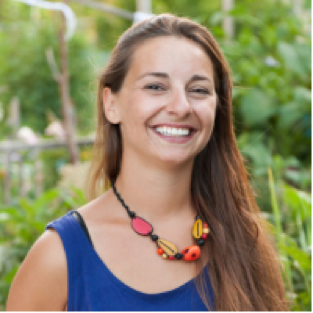Kaylyn Keane plays a vital role in connecting students to the emerging science of offshore renewable energy. In her work with URI Cooperative Extension, she connects the dots between students’ interests and the burgeoning wind industry.
Kaylyn Keane is a Program Coordinator for the URI Cooperative Extension and through the Energy Fellows Program, she recruits and trains students interested in careers pertaining to the clean energy sector. Along with the Cooperative Extension team, Kaylyn develops and implements energy literacy programming to educate the general public, municipal officials and policymakers on issues pertaining to energy conservation, efficiency, and renewables.
Through the URI Energy Fellows Program, she focuses on workforce development and prepares students for professional-level roles in the clean energy sector, including the offshore renewable industry. Kaylyn works directly with companies and organizations working in the clean energy industry to offer experiential opportunities for students. The URI Cooperative Extension created the Energy Fellows Program in 2008 to engage and train students passionate about a career in sustainable energy. To date, the program has seen over 120 students complete program requirements and a large majority now work in the energy industry in Rhode Island and beyond.
Regarding offshore renewable energy, she’s most excited for its potential to provide long term clean energy on a large scale to New England. “It’s exciting that Rhode Islanders are able to take advantage of this technology to meet our climate change goals and take a leading role in its development,” says Keane.
Kaylyn herself holds a B.S. in Environmental Science from the University of Vermont and an M.S. in Ecological Economics from the University of Edinburgh, Scotland. She has more than five years’ experience in sustainability program management, owns a catering business and is also the founder and CEO of an organic sauerkraut company in Providence, RI.
For Keane, her mission is to increase the public’s understanding of “energy literacy”. Energy literacy is defined by the Department of Energy as “an understanding of the nature and role of energy in the world and daily lives accompanied by the ability to apply this understanding to answer questions and solve problems.”
What does energy literacy look like to Keane? “The energy sector in New England is complex, dynamic and evolving rapidly,” says Keane. “In my role of providing up to date and fact-based information to the public, as well as engaging in workforce development, I am always interested in what’s happening in the energy sector.”
Her work is pivotal towards connecting offshore renewable energy between the public and the industry. Whether it be from developing training sessions for the Energy Fellows Program or touring a wind turbine testing facility, Keane is a conduit for the burgeoning energy shift in Rhode Island.
“In the energy sector there is always something new to teach and learn,” says Keane. “I am always interested in ‘what’s next?’”
One thing that Keane has learned is that you don’t need to be an expert in this field to participate in its growth. “An important thing to consider about workforce development in the offshore renewable energy field is that you don’t need to have a degree in ‘offshore renewable energy’ to work at a professional level in this field,” says Keane.

